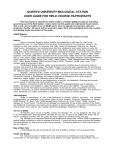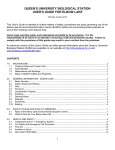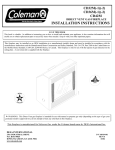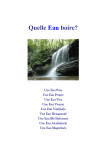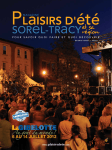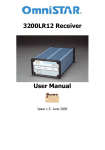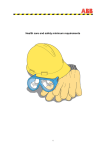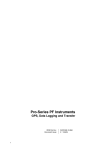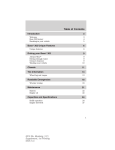Download QUEEN'S UNIVERSITY BIOLOGICAL STATION USER GUIDE FOR
Transcript
QUEEN'S UNIVERSITY BIOLOGICAL STATION USER GUIDE FOR 'REGULARS' This User Guide is intended to outline matters of safety, QUBS procedures and policy governing use of the field station. Users must read this guide and understand its provisions. This is not a trivial matter since all QUBS users must cooperate in ensuring a safe and productive facility. All users will be required to sign a form acknowledging receiving, reading and abiding by the provisions of this guide. History Queen's University Biological Station (QUBS) was established in 1945 when Dr. Wes Curran purchased the point on Lake Opinicon from the Acton family on behalf of the University. Some of the buildings on site were erected in the period 1946-1948, notably the boathouse, Trilab and the "Bunkie Junior" cabins. Development has continued since that time, producing a field station facility of some 30+ buildings - living accommodations, food service space, labs, library, aquarium, computing equipment etc. In spring 2000, the new Operations Centre was completed, replacing the old lodge as our central services building. A number of property acquisitions have also taken place: Sheep Island (1950), Hughson Tract (1976), expansion of the main QUBS site by purchase from the Curtis family (1985), Skycroft Tract (1986), Eastern half of Cow Island (1988), Cape-Sauriol Environmental Studies Area (1989), Pangman Conservation Reserve (1994), Bracken Tract (1994), Moores Tract (1995) and Crabbe Property (1999). Presently, QUBS owns some 2000+ hectares (about 5200 acres) of land. The Biological Station provides quality living and laboratory facilities close to field study sites for teaching and research in field biology. The QUBS mandate is to provide quality opportunities for teaching and research in biology and the environmental sciences. QUBS facilitates both teaching and research by providing the logistical support for these activities. Originally a teaching facility, QUBS has increased its research activities since the fifties. Both education and research are important mandates of QUBS. Currently, involvement with the Ontario Universities Program in Field Biology and research programs of researchers from a wide variety of institutions makes QUBS a vital, interesting site for field biology. In addition, QUBS offers its own programme, the Naturalists' Workshop and hosts a variety of field trips and small conferences each year. Queen's University provides the financial support for the Biological Station and its operation. In addition, the station is the recipient of a Major Facilities Access grant from NSERC. This grant enables research use of the field station by non-Queen's people. In the past few years, researchers from many Canadian universities, as well as international researchers, have conducted studies at QUBS. This diversity of users contributes to a healthy atmosphere of inquiry into an wide array of research topics. Administration QUBS is administered as part of the Department of Biology, Queen's University. The cascade of responsibility for operations is as follows: Dean, Arts and Science; Chairman, Department of Biology; QUBS Director, Dr. Raleigh Robertson; QUBS Manager/Senior Instructor, Mr. Frank Phelan; QUBS Assistant Manager, Mr. Floyd Connor. The Director and Manager are responsible for day-to-day operation of the facility and collaborate on planning, reservations and all aspects of general operations. Accounting is handled through Julie French (Administrative Assistant) and Mr. John Topping, Departmental Manager, Department of Biology. Reservations Research: QUBS is available to any researcher subject to limitations of space. The Director or Manager can provide a description of facilities, current fees and procedures. Each researcher must complete an Application for Lab Space and Accommodation. An application for space must be submitted each year. Applications are normally due by mid-March. On review of all applications, a preliminary space assignment is issued, along with estimated costs of the proposed research and an invoice for a first billing (deposit). Upon receipt of the deposit, a final allotment of space will be made. It is the responsibility of the major researcher to ensure that appropriate review committee approval has been met (eg. animal care, ethics etc.). Principal researchers will be required to provide copies (for QUBS and Queen's Animal Care Committee) of animal care approvals and standard operating procedures approved by their home university and copies of necessary permits to carry out animal work at QUBS. Certain proposals may be inappropriate for QUBS because of safety considerations, biohazards, impacts on natural populations, conflict with established programs or space limitations. QUBS management reserves the right to refuse proposals inappropriate for the site. For example, projects which involve the introduction of life forms which are not indigenous to the area are completely inappropriate to QUBS. Teaching: Field courses are planned at the annual meeting of the Ontario Universities Program in Field Biology (OUPFB) in December. Proposals for OUPFB offerings should be sent to the Director or Manager in advance of this meeting. Proposals for field courses distinct from OUPFB modules should be made to the Director or Manager. These will be approved subject to space limitations. Other teaching activities (eg. field trips associated with university courses etc.) should be approved by the Director or Manager well in advance. Conference Use: This type of use is negotiated with the Director or Manager. Fees for summer conference use are listed in QUBS fee schedule. Fees for conferences at other times are assessed dependant upon facilities used, space and amenities required and number of participants. Guests: Short-term visitors are welcome at QUBS. The Manager must be notified to ensure space availability and to facilitate records-keeping and billing. Details of guest use must be entered by the host on the visitor/guest sheets in the operations centre. Other Uses: Uses other than those outlined above may be permitted. Contact the Director or Manager to discuss possibilities. Arrival at QUBS Immediately upon arrival at QUBS, contact the Manager. He, or his designate will show you to accommodations/lab space/equipment allocated for your use. A copy of the QUBS User Guide will be issued. Familiarize yourself with the guide and keep it handy for reference during your stay. The Manager will obtain personal data from each user: name, affiliation, home address, supervisor, medical insurance numbers, next of kin, special medical conditions, allergies etc. In addition, he will review billing procedures for costs incurred during your stay. If required, he will also outline duties expected under a chores agreement. Map of Main Site A map detailing the area comprising the main site at QUBS is included in the user guide folder. Health and Safety The foremost concern of QUBS staff is the maintenance of a healthy and safe living/working environment at the field station. QUBS users must abide by the safety guidelines outlined herein and do everything in their power to assist staff with health and safety matters. Field work does entail some risk. QUBS users must be aware of inherent risks and endeavour to make assistants and coworkers aware of risk factors. In conjunction with QUBS staff, plans must be put in place to minimize risks to field workers. QUBS safety officer is the Manager, Mr. Frank Phelan. 911 Emergency System QUBS is serviced by the 911 emergency system. Dialling 911 gives access to fire, ambulance and police services. In conjunction with the 911 system, a municipal addressing system has been put into place. If you call 911, you will need to report the municipal address for QUBS: QUBS Municipal Address: 280 Queen's University Road, Township of Rideau Lakes, South Crosby Ward (about 1 mile west of Chaffey's Lock on the Opinicon Road) Emergency Fire Procedure Upon detection of a fire, prime concern is for personal safety. Immediately evacuate the building affected. Proceed to nearest exit, shouting "FIRE, FIRE, FIRE". Make sure everyone is out of the building. Ring the alarm bell outside the operations centre and continue ringing to alert all station users (the operations centre has automatic alarms in case of fire in that building). Notify QUBS management immediately and call the local Fire Department using 911 (or 359-5678) if requested to do so (Emergency numbers are posted at each phone). Assemble in the open area immediately in front of the operations centre for head count and further instructions. Principal investigators should always know the whereabouts of their workers and should assist QUBS staff in accounting for everyone. QUBS is provided with smoke detectors (and Carbon Monoxide detectors) in major accommodations, an alarm system in the operations centre and fire extinguishers in all buildings. However, it is not expected that QUBS users be firefighters. Familiarize yourself with the warning devices, extinguishers and exits in your living/workspace. IF the fire is a minor one (a fire less than 1 m3) and IF you know how to use an adjacent fire extinguisher (training in the use of fire extinguishers is provided at QUBS each summer) and IF you have an exit at your back and IF you are sure you can extinguish the fire, then DO SO. If you have ANY doubts, commence emergency fire procedures as outlined above. Property can be replaced, lives cannot. DO NOT TAKE CHANCES. QUBS has a portable fire pump for firefighting and staff are trained in its use. This will be used when practicable to contain fires until the arrival of the local fire department. Fire Safety Fire protection equipment is provided in all living/workspaces. Equipment is routinely inspected. However, if you should notice defects or missing equipment, notify QUBS staff at once. Fireplaces are provided in several buildings at QUBS. Treat all fires in fireplaces with extreme caution. NEVER leave a fire unattended. ALWAYS use the fire screen. Outdoor fires may be permitted IF conditions are suitable. Outdoor fires will not be permitted under windy or dry conditions or when outdoor burning bans are in place or when such activity interferes with work/sleep schedules of QUBS residents. Smoking For health and safety reasons, Queen's University is a smoke-free workplace. As of January 1, 1990, the Smoking in the Workplace Act has been in effect. As a result, Ministry of Labour guidelines prohibit smoking in enclosed workplaces. At QUBS, there will be no smoking inside ANY building. For safety reasons, there will also be no smoking in boats, station vehicles or in the vicinity of the boathouse and gas shed. Smoking must be done out-of-doors. When smoking out-of-doors, be careful not to create a fire hazard in the woods. Do not dispose of butts on the grounds. Meals Meals are served buffet-style in the operations centre. Station users are expected to bus their own dishes. Normal meal hours are: Breakfast 0730-0830; Lunch 1200-1300; Dinner 1730-1830. The bell outside the operations centre will toll to announce the start of meal hours. Meals will not be served at other hours unless specified by QUBS management. On Sundays, brunch may be served. When scheduled, brunch will run from 0900-1200. Meals are prepared with the provision of a balanced, healthy diet in mind. Normally, vegetarian meals are interspersed with the regular menu. Alternatives to meats are generally available for strict vegetarians. If an individual user requires or desires specialized foods, they will have to provide these on their own. For field researchers, a box lunch is available. 24 hr. notice is to be given to kitchen staff for box lunches. Kitchen and food storage areas are off-limits for QUBS users. Do not remove equipment from the kitchen. Do not help yourself to foodstuffs in fridges or freezers. Snacks will be placed on serving counter. Coffee/tea are always available. For early risers, space will be designated for early breakfast food. Notify kitchen staff of food allergies, special diet conditions etc. Keep food and beverage counters clean. Suggestions for menus are always welcome. Drinking Water Safe drinking water (UV sterilized) from a well is provided only to the operations centre (showers , toilets and laundry in the operations centre are supplied with lake water) and the White House. All other cottages and labs are supplied with untreated water directly from the lake. Lake water is suitable for washing and showering, not for drinking. Blue jugs in the kitchens of cottages contain drinking water. Fill these at the operations centre or White House or notify QUBS staff as required. Disposal Water-borne disposal (toilets, sinks, showers) in living accommodations ends up in septic systems. These systems need to be treated gently. Unlike municipal water systems, care must be taken with septic systems. Do not dispose of non-biodegradable material in toilets (no plastic). Do not dispose of paper towels or cardboard in toilets. Do not attempt to flush bulky items. No chemicals to be disposed of in sinks or toilets. Solid waste should be placed in appropriate containers (using clear plastic bags). Animal material should not be placed with garbage. Consult management re burial or alternate disposal. Take care to safely package material which may pose a handling hazard (eg. broken glass, razor blades, pipettes etc.). Do not dispose of chemicals in garbage. A wide variety of materials is locally recyclable. QUBS actively participates in these programs and encourages all users to cooperate in this effort. A recycling shed is located near the workshop. Compost containers are found in the operations centre. Please deposit non-animal food scraps for composting. This is a good way to reduce the volume of waste destined for landfill sites and produces an ecologically valuable-end-product. Chores To defray to costs of room and board, QUBS users can elect to perform a designated duty. This cooperation also helps us keep costs to a minimum by reducing labour costs. For a reduction in fees, it is reasonable to expect a maximum of 5 hours per week in the performance of duties. Duties will be scheduled and assigned by the Manager. Of necessity, most chores involve dishwashing, though other duties are possible. Chores should not interfere with research work, so various duties and schedules may be assigned to mesh with research time commitments. It is your responsibility to find a substitute if you are unable to perform duties on schedule. Housekeeping QUBS staff attempt to keep common areas clean and tidy. However, housekeeping in individual accommodations and laboratories is the responsibility of the user. In multiple-user accommodations (eg. Curran Cottage), a committee of users should cooperate in keeping common areas clean and tidy. In areas such as the White House which has general-use bathrooms and common areas, the residents have primary responsibility for housekeeping which is supplemented by QUBS staff as necessary. These arrangements are necessary since QUBS does not have the staff required to routinely perform these tasks. Also, costs of housekeeping would undoubtedly be passed on to the user. Your cooperation helps keep costs low. Simple things like removing outdoor footwear at entrances and mopping up spills as they happen will greatly assist with keeping QUBS buildings clean and tidy. In general, users will consistently assist with housekeeping by applying the rule of thumb, "Leave it at least as clean as you found it". Swimming Swimming areas at QUBS are unprotected areas. There is no lifeguard provided. Swimming is entirely at your own risk. Do not swim alone, after dark or while impaired. There are two swimming areas used at QUBS. Different levels of swimming ability are required for each area. Keast's beach is ideal for children under adult supervision and for poor swimmers. Use of the beach area is sometimes restricted so as to not interfere with ongoing research projects on nesting fish. The diving board area, with its deep water, should not be used by other than competent swimmers. Safety equipment in the form of throw rings and ropes are placed by swimming areas. Do not remove or play with safety equipment. Be advised that the area off the diving board is a channel heavily used by boat traffic. It is dangerous to swim far out from shore or back and forth across this channel. There are inherent dangers in recreational swimming. Be safe. Recognize the hazards. Boating QUBS owns and maintains a fleet of boats. These are NOT for general use. Rather, they are leased to investigators as research tools. Boats are fundamental research tools to field researchers. In addition, they are expensive tools and in inexperienced hands, very dangerous. Research Use: When a boat is leased to a researcher, that boat is for exclusive use of that researcher and his assistants for the duration of the lease period. Use for any other purpose is by permission only of the researcher responsible for the boat. Before a boat is turned over to a researcher, a training session is required of all potential users. This session will ensure that users have a basic knowledge of boating safety, rules of the road, minimum safety equipment required, operation of outboard motors, hazards, signout sheets and security arrangements. By September 2002, anyone operating a motorboat less than 4 metres in length will require proof of competency. This can be obtained by taking a course and a test or by obtaining the course book and sitting a test. As of September 2002, QUBS will require this proof of competency of all motorboat users before permitting boat use. In the interim, QUBS staff encourages those planning extensive boat use to obtain an operator’s card. If unavailable, QUBS will test potential users knowledge of regulations and ability to handle equipment before use. QUBS provides the minimum safety gear for QUBS boats. All outboard motor boats require, by law, a life jacket or approved personal flotation device for each passenger, a set of oars OR an anchor with 15 metres of line, 15 metres of buoyant heaving line, a bailer or manual pump, a sound signalling device (whistle) and a watertight flashlight or 3 flares. Life jackets (PFD's) are provided inside the boathouse. Oars and bailing cans are kept in the boats. Boat users must be certain that this minimum safety gear is present each time the boat is taken out. QUBS provides a lock and chain for each boat. Boats are to be kept locked when not in use. Locking prevents unauthorized use or theft of equipment. Each boat is identified by individual number and docking space. A signout sheet is also assigned for each boat. As a safety precaution, boats are to be signed out each time they leave the dock. QUBS staff will know who has the boat at any given time, where they went and when they expect to return. If, for any reason, the boat fails to return at the indicated time, a search can be initiated. Boats and motors are expensive research equipment. If your boat or motor needs servicing, notify the Manager immediately. Tie boats securely at the dock so they cannot be damaged by contact with other boats, the dock itself or other equipment. Do not allow boats to rest on shores subject to wave action. This will wear the hull. Keep speeds to reasonable levels. No racing or horseplay in boats. You are responsible for your actions as operator of a motor vehicle. You are also responsible for damage caused by the boat's wake. Keep an eye on weather conditions. It is dangerous to be out in small craft during windstorms, thunderstorms and during periods of cold air and water temperatures. A numbered gas tank is provided with each boat. NEVER SWITCH GAS TANKS. This will damage equipment. QUBS staff will fill your gas tank upon request. Gasoline and oil are charged to the researcher's account (Oil is subject to P.S.T.). Use of boats may be denied to anyone operating a boat in an unsafe manner. Recreational Use: QUBS canoes may be available for recreational use. Users must be familiar with boating safety and use of canoes. Canoes require the following basic safety equipment: a lifejacket for each person, paddles, 15 m of buoyant heaving line, a bailer and a soundsignalling device (whistle). Be sure that these are in the canoe each and every time it is used.Canoes belonging to the station must be signed out. Do not use private canoes without the permission of the owner. Always let someone know where you are going and when you expect to return. Outboard motor boats must not be used for recreational purposes without permission. Generally, QUBS outboard motor boats will not be available for recreational uses. In the event that a boat is made available for such uses via permission of QUBS staff, proof of competency must be provided by the operator. Teaching Use: Special care must be taken when operating boats for teaching purposes. Operators must be trained in boat safety and operation (see above). Large craft with many passengers are difficult to handle and require practice and good judgement. When unskilled users are involved, QUBS staff will pilot boats for teaching purposes. Operation of boats requires special caution. There are many hazards in Lake Opinicon, especially drowned lands and Rideau Canal traffic. Operators are responsible for their actions and the minimum safety equipment. Misuse, abuse or dangerous operation of any QUBS boat will not be permitted. Accident or Injury Principal investigators are responsible for ensuring safe working conditions for their graduate students and assistants. QUBS management MUST be notified immediately of ANY accident or injury sustained while on Queen's Property. The Manager can assist the Principal Investigator with accident reporting (Institutional and WSIB). First aid and transport for medical attention can also be arranged by the Manager. In serious instances, do not wait for the Manager, call an ambulance via 911 (or 359-5390). QUBS staff endeavour to provide a safe environment at the field station. QUBS staff will work with Principal Investigators to ensure safe working conditions. If users note deficiencies, hazards or unsafe conditions, report these at once to the Manager. Do not attempt repairs yourself. First Aid First aid kits are provided in the lodge, White House, Manager's House, Workshop and Lower Brown Lab. These are inspected regularly. However, if required items are used up or missing, notify the Manager. Even small injuries benefit from prompt attention. Many QUBS users may have qualifications in first aid, CPR, lifesaving or other skills. Please advise the Manager of special training you have. These qualifications will be posted in the lodge. Some of your compatriots may benefit from your abilities. Laboratory and Field Safety Projects: QUBS management is concerned that all projects be carried out with appropriate safeguards. There are risks in laboratory and field work. It is imperative that risks be assessed, that everyone affected be made aware of these risks and that everything possible be done to minimize these risks. Principal Investigators must work with QUBS staff to ensure that a safe working environment is maintained at QUBS. QUBS will endeavour to conform to the Field Research Safety Policy of Queen’s University. Radioisotopes and any life forms containing "engineered genes" may not be used in projects without an extensive review and approval process. Investigators must provide details of such projects at least three months in advance for radioisotope use and at least six months should be allowed for engineered-gene projects. Proposals involving work with chemicals must be reviewed with the Director or Manager. Provisions must be made to ensure that appropriate safety data accompanies every chemical brought to QUBS. Principal Investigators should be prepared to supply Material Safety Data Handling Sheets (MSDS's) and lists of chemicals brought to QUBS. MSDS's are available by computer link to the mainframe computer at Queen's. The Manager will assist with obtaining required MSDS's. Provision must also be made for disposal of waste chemicals. No chemical disposal will be allowed by dilution, flushing down drains or dumping on site. The Manager will consult with each Principal Investigator to discuss details of chemical lists, labelling, MSDS's, storage on site and disposal. Training: It is the responsibility of the Principal Investigator to ensure that his graduate students and assistants are trained in laboratory safety and receive Workplace Hazardous Materials Information System (WHMIS) training when working with chemicals or biohazards. WHMIS training may be arranged through the Manager. Queen's Department of Occupational Health and Safety offers WHMIS training twice each year. In the May session, summer workers could be sent for training. Similarly, field workers must be informed of safety risks and be provided with the necessary training and appropriate safety equipment. Chemical Storage: No chemical will be present in open labs in containers exceeding 1 litre in size. No chemical will be present in flammables cabinet in volume exceeding 4 litres. Flammable chemicals must be stored in the yellow flammables cabinet inside the lower Brown Lab. No flammable chemicals will be stored in regular refrigerators because of the risk of explosion. Refrigerators must be identified as chemical storage or food and beverage storage, not both. Do not store incompatible chemicals side by side. Disposal: Wide-mouth disposal containers are available for liquid chemical disposal. The Manager will arrange to have these picked up and taken to Queen's Safety for ultimate disposal. Hazardous waste must be clearly identified. Safety Equipment: It is the responsibility of the Principal Investigator to ensure that they and their workers are provided with laboratory and field safety equipment appropriate to the work. QUBS is not an appropriate site for studies requiring extensive chemical use. Please bring only those chemicals absolutely required to QUBS and in as small amounts as possible. Workshop Over time, QUBS has built and equipped a workshop with wood- and metalworking tools. Use of the workshop is available to all QUBS users. All users must be trained by QUBS staff in proper and safe use of shop equipment. A training session will include functions of equipment, safe use, safeguards, protective safety equipment etc. Shop projects must be discussed with QUBS staff in advance. This will allow scheduling of necessary training, minimize conflicts of equipment use and enable fair access. In addition, QUBS staff have considerable shop skills which will benefit most shop users. Time permitting, QUBS staff may be available to undertake projects on behalf of researchers. Tools may be borrowed from the workshop for short periods of time. All tools must be signed out. For routine work with common hand tools, a toolbox, stocked with simple tools, is available. Workshop equipment can be extremely dangerous. Untrained users will not be allowed to operate equipment. Protective safety gear must be worn. The workshop will normally be locked unless QUBS staff are at hand. Mail The correct mailing address for QUBS is: Queen's University Biological Station P.O. Box 31, RR # 1 Elgin, Ontario K0G 1E0 Mail is normally collected from the mailbox on a daily basis. Mail received is placed in the "Royal Snail" baskets in the lodge. Outgoing mail can be placed in the designated basket. Telephones With the number of users growing over the years, telephone communication has presented its problems. Presently, the main line connects to phones in the Manager's House, White House and operations centre. These phones are primarily for business calls and for incoming calls. These telephones are programmed to for local calling only. These four phones are accessed at (613)359-5629. Anyone answering these phones is expected to assist the caller in locating the person called or in taking a decipherable message. Messages should be posted on the bulletin board in the lodge. Personal calls must be made from the “pay phone” in the operations centre. This "Millennium" phone will accept Bell calling cards, prepaid phone cards, or major credit cards. You can also call collect or third party through the Operator. Use of this phone will keep business lines clear and minimize the billing of charges necessitated by uncontrolled use of the main line. This phone is equipped with a data port for electronic communications. In the operations centre, a second telephone line is available for Principal Investigators only. Intended as a business phone, this phone is unavailable for personal calls. When station phones are used for business or research, Principal Investigators can simplify billing and records-keeping by use of a calling card set up for business/research use A modem link is available, linking the QUBS local area computer network with outside e-communications. E-mail can be checked/sent using the computers in the lower foyer of the operations centre. There is a FAX machine in the operations centre. The FAX machine is intended to facilitate research and is primarily for use by principal investigators. When sending a FAX, fill out a FAX Cover Sheet and deposit in the tray after transmission. The QUBS FAX number is (613)359-6558. Fees Fee schedules for the year are printed in the Annual Report and Newsletter (available on QUBS website). In addition, each Principal Investigator will receive a copy with the Application for Lab Space and Accommodation. A summary is posted on the notice board in the lodge. Most fees are based on the user-pay principle. QUBS tries to recover the costs of room and board, boat rental, telephone use, FAX and photocopying. Charges apportioned to users for oil (boats) and photocopying are subject to Provincial Sales Tax. Bench fees are charged to all researchers to contribute to direct operating costs (hydro, heat, maintenance etc.) of the facilities at QUBS. Basic Services Fundamental services (water supply, septic systems, electrical supply, heat, telephones etc.) are the direct responsibility of QUBS management. Point out problems or concerns as they arise. Do not attempt repairs yourself. Be advised that many of these services are buried. Do not drive stakes/posts/poles or excavate without consulting QUBS management. In this era of concern for the environment and energy conservation, users should try to conserve energy by minimizing use of basic services. Do not waste water, electricity or heat. Alcoholic Beverages Queen's University does not permit alcoholic beverages in its workbuildings (operations centre, workshop, aquarium or labs). However, alcoholic beverages are permitted in individual residences. Keep bottles and cans out of plain sight. Even a few empties in plain view give the wrong impression to visitors to QUBS. It is expected that QUBS users will behave in a decorous manner at all times. Road/Gate The access road into QUBS is narrow, winding and has several blind corners. QUBS users must use extreme caution when using this road. The access road into QUBS is available only through a restrictive lease agreement. Speed limit signs must be obeyed. The gate, when closed to contain cattle, must be kept closed. Violations of these conditions could mean loss of access. The volume of traffic by QUBS users dictates that special caution be exercised in using the roadways of the field station. Children, walkers, runners and bicyclists share these roadways. Near buildings, slow speeds will reduce the amount of dust created and minimize hazards. Operate all vehicles with utmost care. Parking To maintain access to all buildings for users, maintenance vehicles and emergency vehicles, vehicles should not block roadways, ramps, driveways or access to any building. Most vehicles should be parked in the lots next to the workshop. Cottage dwellers may park near their residences on provision that doing so will not block access. No parking anywhere on the loop down to the boathouse. Stopping to load or unload equipment is permitted. After these operations are completed, the vehicle must be removed to a designated parking area. Cooperation Among Users All QUBS users should respect the need for integrity of research projects and make every effort not to disturb other research efforts. In addition, every QUBS user has the right to privacy and non-disturbance. Be aware that not all users operate by the same schedule. Do not disturb others trying to sleep. Immediately cease disruptive activities upon peer request or when directed by QUBS staff. Research/teaching activities always have priority over recreational ones. Pets No pets are permitted at QUBS. Programs The atmosphere of QUBS should be akin to a cooperative. Users gain a great deal by interacting with each other, management and the local community. A number of programs aid this interaction. Seminars: A schedule of weekly evening seminars is arranged to facilitate communication of ideas among QUBS regulars, management, visitors and guest speakers. Principal Investigator Meetings: These meetings allow discussion of policy and operation of QUBS. Input from major users by management is sought. General User Meetings: From time to time, general user meetings may be scheduled to discuss plans for events, policy, procedures and to receive feedback from users. Visiting Scientist: Research Services at Queen's provides financial support for this program. Intended to bring an established researcher, who might not otherwise spend much time at QUBS, to the field station, the program adds an extra dimension to life at QUBS. The Visiting Scientist will offer seminars on current research and directly interact with QUBS users throughout his/her stay. Open House/Community Newsletter: Each summer, QUBS hosts an Open House day and distributes a Community Newsletter. These efforts are directed at promoting a greater interaction and understanding between QUBS users and the local community. Users are expected to cooperate in these valuable programs. The Open House is usually scheduled for a Sunday in July and open to the public from 1200-1500 hrs. Researchers should prepare a display of projects and assist with tours. The Community Newsletter is prepared in consultation with researchers. It is distributed to households throughout the area. The newsletter provides contact with those unable to attend the Open House. Annual Report and Newsletter: QUBS staff prepare this report to document research and teaching activities. It is distributed to Queen's administration, QUBS users and supporters. The report provides a valuable reference to past projects, personnel and publications. In addition, the newsletter portion outlines major events at QUBS each year, including acquisitions, improvements, significant events in the personal lives of users and trends in use. Each researcher is invited to provide material for inclusion in the report. A brief summary of research, the project or thesis title, supervisor (if applicable), list of assistants and list of publications resulting from this work should be submitted. Public Relations Research and teaching activities take QUBS users to many parts of the lake and surrounding areas. User activity is often conspicuous and generates curiosity in observers. In the field, you are seen as a representative of the university, QUBS and researchers/teachers in general. Be certain that your observable behaviour in the field is beyond reproach. Make sure that you acquire proper permits for work, ask permission for access to private property and are courteous and careful in field operations. Always remove research paraphernalia from study sites after completion of a study (especially flags, markers). Be prepared to respond politely to queries from curious observers. Encourage keen locals to attend the Open House. The position of the field station in the community and its ultimate survival as a productive research/teaching environment depends on a good working relationship with local individuals and interests. Sexual Harassment Queen's University has a comprehensive process for dealing with complaints of sexual harassment. You are being sexually harassed when you are the receiver of unwanted, unasked-for attention of a sexual nature. Examples of such behaviour are: sexual remarks, suggestive comments or gestures, physical contact or conduct that interferes with your dignity or privacy. Contact the Manager or Director for further information concerning complaint procedures. Other Amenities Research Property: QUBS owns extensive tracts of land which are available for a variety of research/teaching purposes. Particular needs should be discussed with QUBS management. (((Maps when available))). GPS (Global Positioning System) Equipment: QUBS owns two Trimble GPS backpack units with submetre accuracy and real-time correction capability. In addition, two hand-held units are available. This equipment can be made available for use in teaching and research programs. QUBS also has a depth recorder which can be coupled with the GPS units. Available software enables production of detailed maps on site. See Frank Phelan or Floyd Connor to discuss use of this equipment. GIS (Geographic Information System) Equipment: QUBS is developing a GIS which will store available information about QUBS properties and neighbouring lands. The system is based on AutoCad Map and is housed in the lower operations centre. Contact Frank Phelan or Floyd Connor for further details and access. All-Terrain Vehicle (ATV): QUBS has an ATV for occasional use by researchers. This vehicle is intended to permit access to remote sites, especially when a large amount of equipment is required. This ATV is not a toy and is not for recreational use. Use of an ATV requires special training and careful handling. QUBS staff will provide an introduction to use of the QUBS ATV and users will have to pass a test based on safety materials obtained from the 4H clubs. Helmets must be worn at all times. Joyriding, racing or handling the machine in a dangerous manner is prohibited. Care must be taken not to damage trails, paths, shorelines when in use. Operation of the ATV must not conflict with other research uses of QUBS properties. Contact QUBS staff for access to the ATV and to schedule training/testing sessions before use. Aquarium: A variety of tanks for holding fish or for experimentation or observation is available at QUBS. Tanks can be supplied with lake or well water, warm or cold water, and oxygen (air). Individual experimental rooms can be assigned. Discuss needs with QUBS management. Library: Basic reference material is contained in the library. Holdings are limited to incomplete runs of some journals and some of the more basic reference materials, field guides etc. QUBS has a reasonably complete collection of theses resulting from field work at the field station. Library materials are not to leave the building. Weather Station: Fundamental data of physical environmental conditions are obtained at QUBS. The Assistant Manager, Mr. Floyd Connor is responsible for the operation of the weather station. Inputs are recorded for air temperature, relative humidity, rainfall, windspeed, wind direction, solar radiation, and three water temperatures. Data are available as computer files, on CD, hard copies or summaries on request. Computer: For general use, several PC's and a Hewlett-Packard LaserJet III printer are available. For a fee, linking a computer to the local area network at QUBS is possible - see staff for details. The GIS is housed in a dual-processor computer in the operations centre. Check with QUBS staff for access to this machine. Some software is available for general use. Consult with QUBS staff to determine what is available. You will need to provide your own data disks. Insect Collection: In the collections room of the upper Brown Lab, QUBS has a basic reference collection of local insects. Researchers interested in using or contributing to the collection should contact QUBS staff. Photocopier: A photocopier is available in the office area of the operations centre. Record the number of copies produced in the logbook. You will be billed for each copy. Photocopying is subject to Provincial Sales Tax. Specimen Freezers: For storage of frozen specimens, two freezers are available. One is located in the basement of the White House, the other in the Bird Lab North. Consult with QUBS management concerning use of these freezers. Do not use for storing foodstuffs. Liquid Nitrogen Dewars: Two Dewar units are available for ultracold storage of specimens. A 21 litre container with 9 small containers is available for field use, short-term storage and transportation. A 47 litre container with 6 large containers is available for long-term storage. Principal investigators using Dewars will be charged for the liquid nitrogen used to fill these containers. To arrange filling of Dewars, contact QUBS management. Water Distillation: Distilled water can be produced at QUBS. A Barnstead still is situated in the Trilab. Consult QUBS staff for details of use and operation. Optical Equipment: QUBS has a few microscopes available for on-site use. Presently, we have four compound microscopes (light microscopy capability), 10 dissecting microscopes and one quality teaching-head dissecting microscope. Also available are binoculars and a spotting scope and tripod. Slide projectors and overhead projectors are available for use. Access to this optical equipment is via QUBS staff. Balances: A general-use weighing station has been developed in the White House basement lab. A Mettler AE100 electronic pan balance (accuracy to 0.1 mg) is installed atop a marble slab weigh table. Also available is an Ohaus C305 electronic top-loading balance (accuracy to 0.1 g). The former is a precision balance, requiring special care during use. The latter is more durable and should be used for wet weights of specimens etc. Other Equipment: Limited collecting equipment, sound recording equipment, fish nets and traps, insect nets etc. are also available by contacting QUBS staff. Washer/Dryer: Coin-operated machines are located in the laundry room of the operations centre. Pop Machine: A coin-operated pop machine is located in the lower foyer of the operations centre. EMERGENCY NUMBERS FOR QUBS USERS QUBS IS SERVICED BY THE 911 system (Fire Department, Police and Ambulance) QUBS IS LOCATED AT 280 QUEEN'S UNIVERSITY ROAD, TOWNSHIP OF RIDEAU LAKES, SOUTH CROSBY WARD -------------------------------------------------------------- Emergency services can also be reached at: ELGIN FIRE DEPARTMENT 359-5678 AMBULANCE 359-5390 Ontario Provincial Police 1-888-310-1122 Ontario Provincial Police (Elgin) 359-6650 (inquiries - office hours only) POISON INFORMATION CENTRE 1-800-267-1373 EMERGENCY REPORT CENTRE (Queen's Campus) 533-6111 Ontario Hydro (Perth) 1-800-267-1650 April 4, 2001










